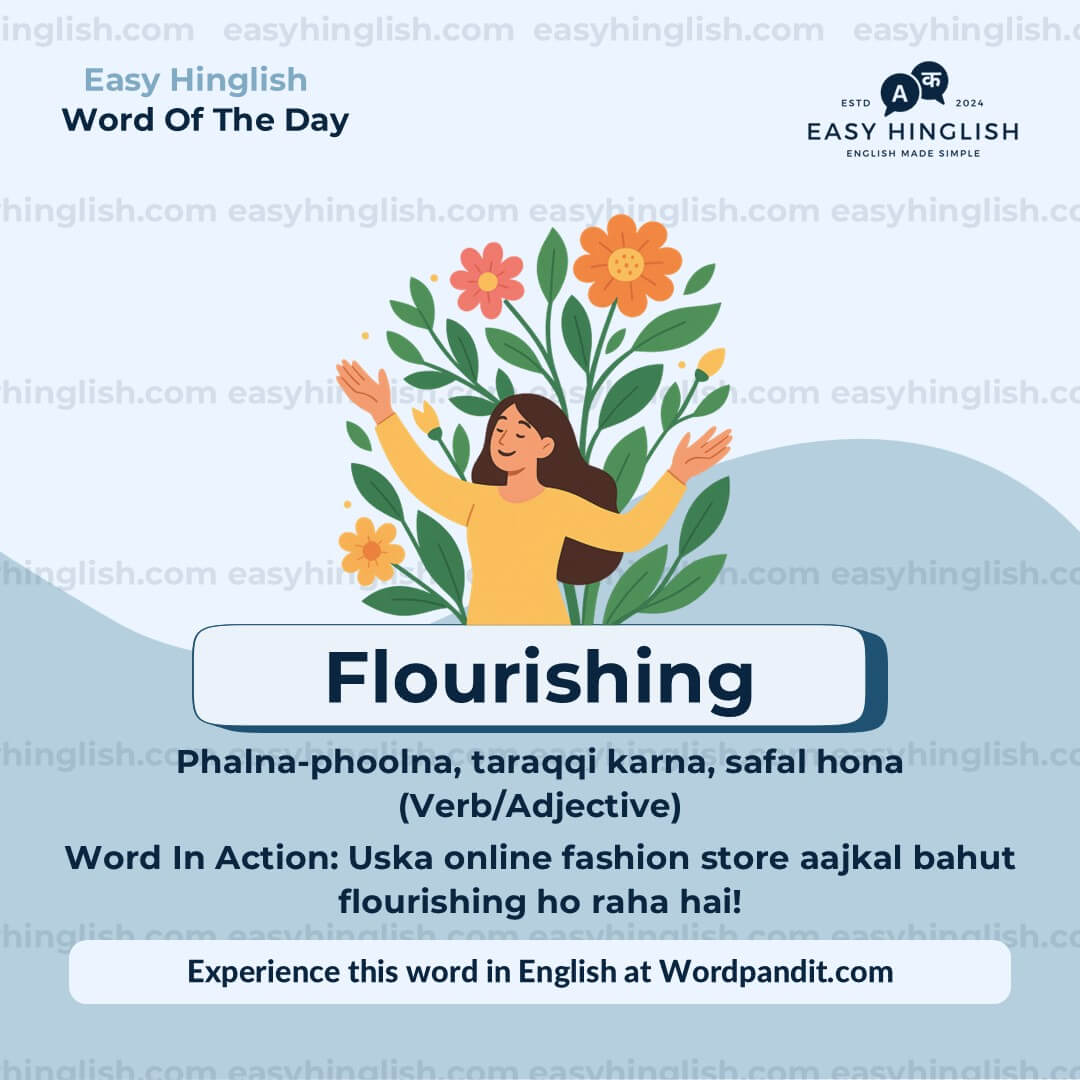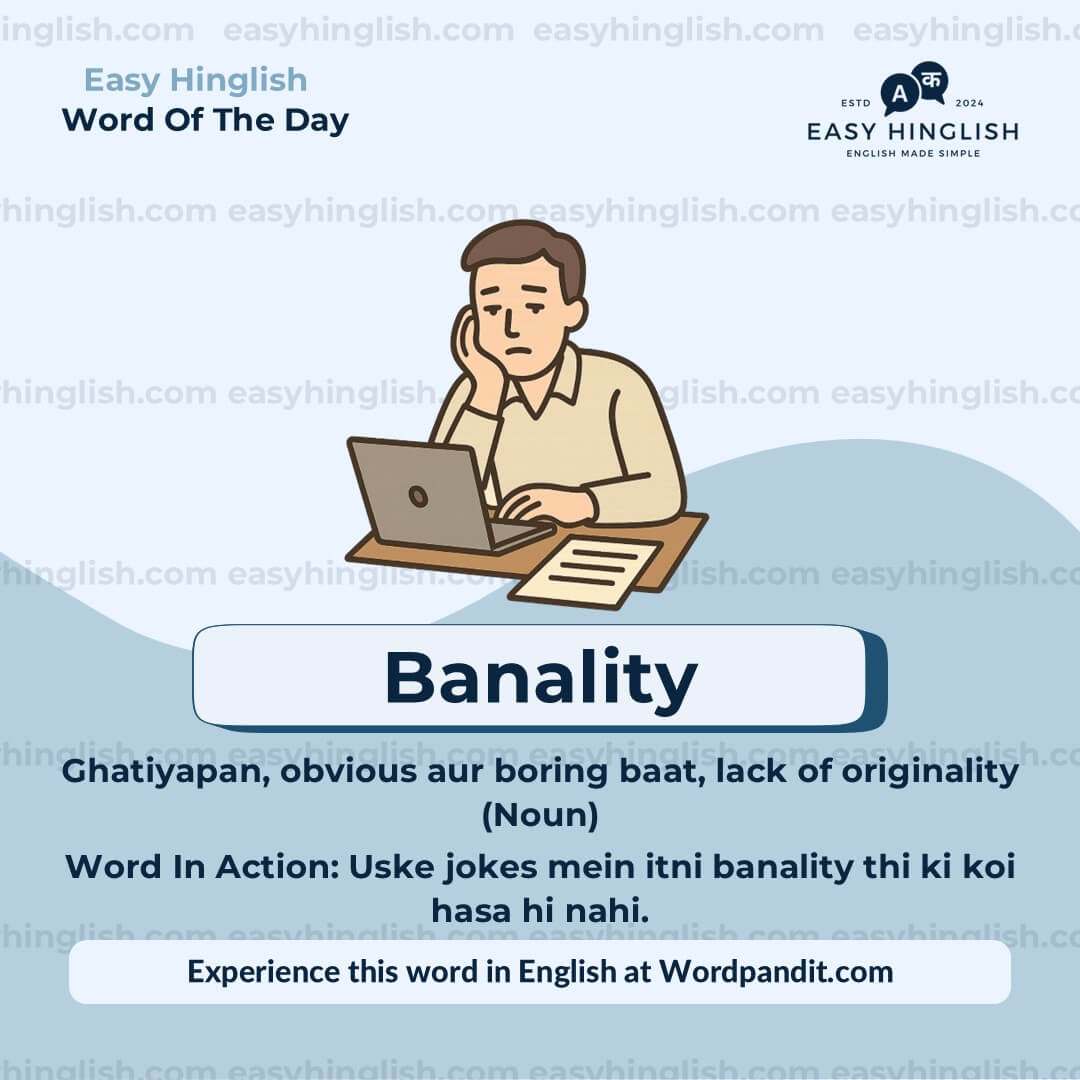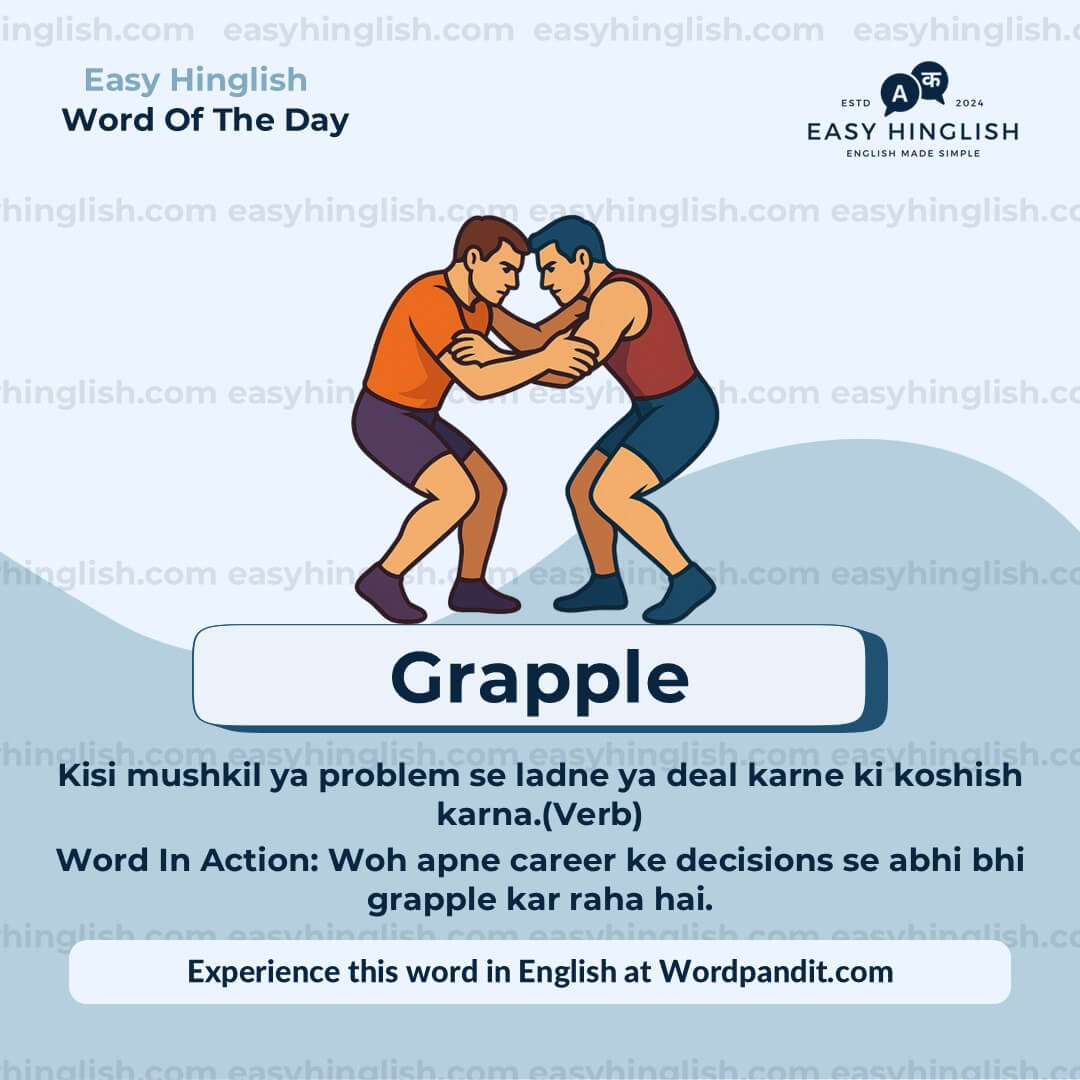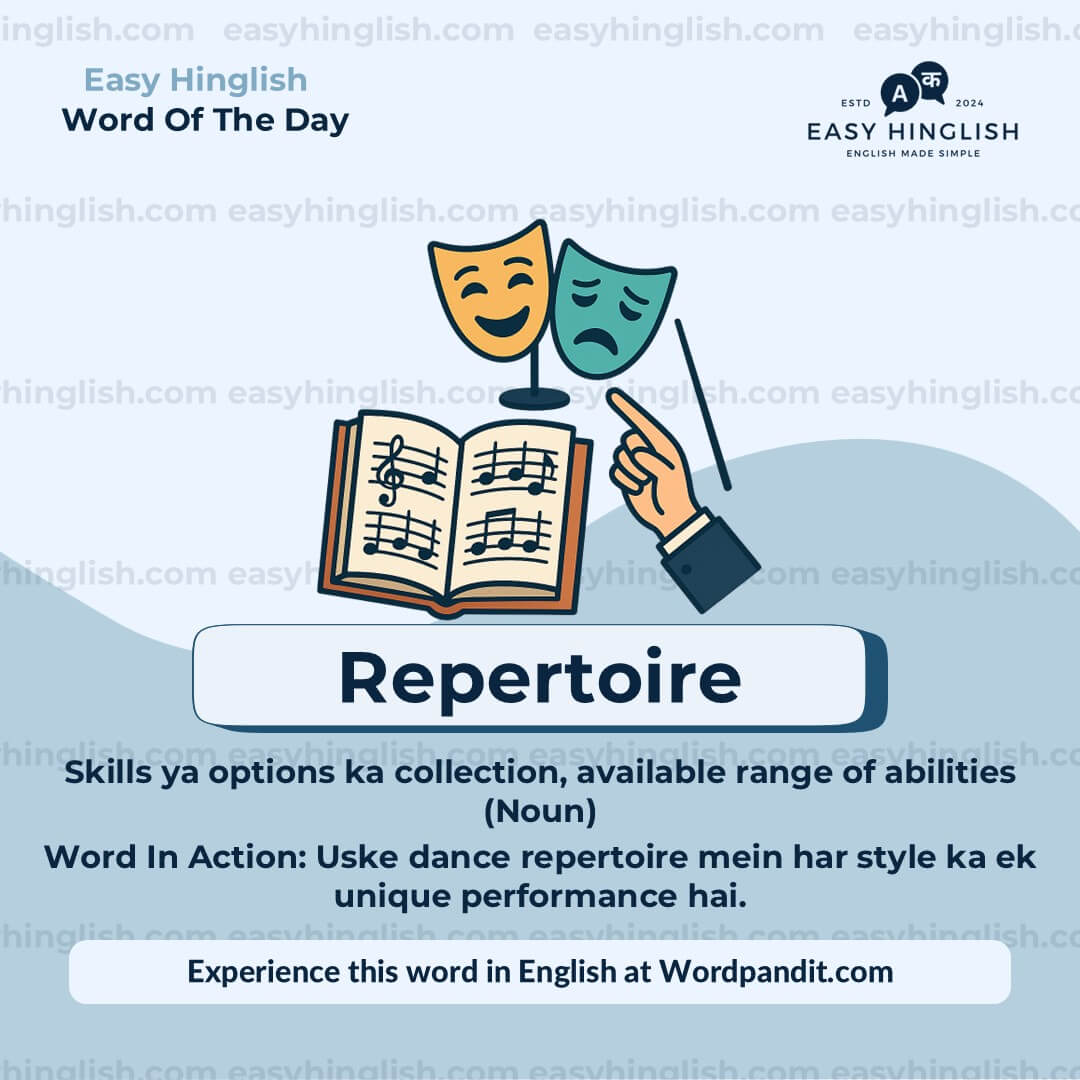Daily Vocabulary International Newspapers aur Publications se Seekho
Wordpandit ke Global Vocabulary Hub ke Saath Apni Vocabulary Expand Karo
Wordpandit par, hum aapko ek truly global vocabulary develop karne me madad karte hain, jo duniya ke sabse respected international publications se li gayi hoti hai. Yeh section aapko naye words se introduce karne ke liye design kiya gaya hai jo global conversations aur trends ko define karte hain.
Global Sources ka Power
Aapko globally sochne aur communicate karne me madad dene ke liye, hum vocabulary curate karte hain world ke top international sources se, jaise:
- The New York Times
- The Washington Post
- BBC
- The Guardian
- The Economist
- Scientific American
- Psychology Today
- Aur bhi bahut saare...
Globally Socho, Competitively Seekho
Hamare daily updates se aap international publications ke naye words seekhoge jo global news aur developments se jude hote hain. Isse aapki vocabulary current bhi rahegi aur globally relevant bhi.
Apni Global Soch Ko Expand Karo
Agar aap international exams ki tayari kar rahe ho, global business communication me excel karna chahte ho, ya sirf apni language skills improve karna chahte ho, toh Wordpandit aapko global level pe grow karne ke liye best resources provide karta hai.
Smart Learning, Global Reach
Hamari learning methodology me global examples, memory aids, aur interactive activities shamil hain, jo naye words ko effectively yaad karne aur real-world me use karne me madad karti hain.
Aaj Hi Apni Global Vocabulary Journey Shuru Karo!
Wordpandit Kyun Choose Karein?
Practical Learning: Aise words seekho jo real-world reading aur communication me aapko sach me kaam aayenge, taaki aapki comprehension aur bolne ki skills improve ho.
Diverse Content: Current affairs se lekar scientific breakthroughs tak, hamare different sources aapko multiple domains ki vocabulary seekhne ka moka dete hain.
Effortless Integration: Wordpandit ko apni daily routine ka part banao. Sirf kuch minute har din dene se aapki vocabulary time ke saath kaafi improve ho sakti hai.
Vocabulary Mastery Tak Ka Aapka Safar
- Regularly hamare Daily Vocabulary section ko visit karo
- Naye words explore karo aur unka context me use samjho
- In words ko apni writing aur bolne ki practice me use karne ki koshish karo
- Jaise-jaise aapke words badhte hain, apni progress ko track karo
Aaj Hi Apni Vocabulary Journey Shuru Karo!
Wordpandit ke saath vocabulary improve karna start karo. Roz thoda effort dalne se aap ek strong vocabulary develop kar sakte ho jo academic, professional, aur personal life me kaafi kaam aayegi.
Yaad rakho, ek naya shabd roz seekhna linguistic limitations ko door karne ka best tareeka hai! Wordpandit ko apni daily learning journey ka sathi banao aur vocabulary excellence ki taraf badho!
WORD 1: Flourishing
Sandarbh (Context):
"...choice has become more and more important to conceptions of human flourishing." - Aeon
Vyakhya (Explanatory Paragraph):
Flourishing ka matlab hai 'phalna-phoolna ya taraqqi karna'—jab koi insaan, samaaj ya cheez apni full potential achieve kare aur successful ho. Yeh word tab use hota hai jab growth, prosperity aur overall well-being ki baat karni ho, sirf material success nahi balki complete development ke baare mein. Flourishing ko philosophy, psychology, business writing aur competitive exam essays mein use karte hain jab holistic development ya thriving condition describe karni ho. CAT aur GRE reading comprehension passages mein yeh word aksar human development, societal progress ya economic growth ke contexts mein milta hai.
Arth (Meaning): Phalna-phoolna, taraqqi karna, safal hona (Verb/Adjective)
Uccharan (Pronunciation): FLUH-rish-ing (फ्लरिशिंग)
Kathinai Star (Difficulty Level): ⭐⭐ Basic se Intermediate
Utpatti (Etymology): Flourishing Latin word 'florere' se aaya hai jiska matlab hai 'phoolna ya bloom karna,' jaise flowers phoolte hain. Middle English mein yeh word 'florisshen' ban gaya aur gradually iska meaning expand hua—ab yeh sirf plants ke liye nahi balki humans, businesses, aur societies ke successful growth ko describe karta hai. Modern usage mein flourishing ka sense hai complete well-being aur thriving in all aspects of life.
Prashant Sir Ke Tathya (Prashant Sir's Notes):
Bahut students flourishing ko sirf 'growing' ya 'successful' se confuse karte hain, lekin flourishing mein deeper meaning hai—yeh complete well-being aur holistic development suggest karta hai, sirf material success nahi. Flourishing aur thriving mein kya farak hai? Dono similar hain, lekin flourishing zyada philosophical aur long-term prosperity indicate karta hai. CAT aur GRE ke students ke liye, flourishing aksar philosophy, psychology ya economics passages mein dikhta hai jahan human development models discuss hote hain. Competitive exam essays mein flourishing ka sahi istemal kaise karein: jab aap argue kar rahe ho ki society ya individual complete development achieve kar raha hai—sirf economic growth nahi, balki happiness, freedom aur fulfilment bhi. Indian English articles mein aapko 'flourishing democracy' ya 'flourishing startup ecosystem' milega—yeh signal karta hai ki healthy aur sustainable growth ho rahi hai.
Samanarthi & Vipritarthi (Synonyms & Antonyms):
Samanarthi (Synonyms): thriving, prospering, blooming, succeeding, booming, phalna-phoolna, taraqqi karna, viksit hona, safal hona, growing
Vipritarthi (Antonyms): declining, failing, struggling, withering, deteriorating, ghatna
Udaharan (Usage Examples):
- India ki digital payment ecosystem pichle kuch saalon mein remarkably flourishing rahi hai, especially UPI adoption ke baad.
- Priya ki consultancy business flourishing thi kyunki usne client relationships par focus kiya, sirf profits par nahi.
- Philosophers argue karte hain ki true human flourishing sirf wealth se nahi balki meaningful relationships aur personal growth se aati hai.
- Bangalore ka startup culture flourishing hai—har mahine naye companies launch ho rahi hain aur talent city mein aa rahi hai.
Sanskritik Sandarbh (Cultural Reference):
"Jab kisi desh ki economy flourishing hoti hai, tab uske citizens ke paas opportunities aur choices badh jaati hain—yeh true development hai." - Common economic discourse in Indian media
Sochiye (Think About It):
Kya material prosperity hi flourishing hai, ya phir mental peace, relationships aur personal freedom bhi zaroori hain? India ke context mein, kaise define karenge ki koi individual ya society truly flourishing hai?
Chhoti Kriya (Quick Activity):
Apne aas-paas ke do examples identify karein—ek individual jo flourishing hai aur ek business ya institution jo flourishing hai. Ek sentence mein explain karein ki kyun woh flourishing consider ho rahe hain.
Yaad Karne Ka Tarika (Memory Tip):
'Flourishing' ko aise yaad rakhein: 'FLOUR-ishing'—imagine karo ek phool (FLOWER) jo fully BLOOMING hai, healthy aur beautiful. Jaise flower perfect conditions mein khilta hai, waise hi flourishing ka matlab hai complete aur healthy development in all aspects.
Vastavik Jeevan Me Upyog (Real-World Application):
Business reports, economic analysis aur social commentary mein 'flourishing' commonly use hota hai successful growth aur holistic development describe karne ke liye. Corporate presentations mein "flourishing team culture" ya "flourishing market presence" likha jaata hai positive progress show karne ke liye. Academic essays aur philosophy papers mein yeh word human well-being aur complete development discuss karne ke liye essential hai—especially jab material success se beyond jaake overall quality of life ki baat karni ho.
WORD 2: Conception
Sandarbh (Context):
"...choice has become more and more important to conceptions of human flourishing." - Aeon
Vyakhya (Explanatory Paragraph):
Conception ka matlab hai 'kisi cheez ke baare mein soch ya idea—kaise aap kisi concept ko samajhte ya imagine karte hain'. Yeh word tab use hota hai jab aap kisi topic, theory ya idea ke baare mein apni understanding ya mental picture describe kar rahe ho. Conception ko academic writing, philosophy, research papers aur competitive exam passages mein use karte hain jab different perspectives, interpretations ya ways of thinking discuss karni ho. CAT aur GRE reading comprehension mein yeh word frequently milta hai jahan author different viewpoints ya theoretical frameworks compare kar rahe hote hain.
Arth (Meaning): Dharna, soch, idea ya kisi cheez ko samajhne ka tarika (Noun)
Uccharan (Pronunciation): kun-SEP-shun (कन्सेप्शन)
Kathinai Star (Difficulty Level): ⭐⭐⭐ Intermediate
Utpatti (Etymology): Conception Latin word 'concipere' se aaya hai jiska matlab hai 'lena ya grasp karna,' jo 'com-' (together) aur 'capere' (seize karna) se bana hai. Originally iska use biological sense mein hota tha (pregnancy), lekin gradually iska meaning expand hua aur ab yeh mental process—ideas ko form karna ya samajhna—describe karta hai. Modern English mein conception primarily intellectual understanding aur viewpoint ke liye use hota hai.
Prashant Sir Ke Tathya (Prashant Sir's Notes):
Students aksar poochhte hain: conception aur concept mein kya farak hai? Concept ek specific idea hai (jaise 'freedom' ek concept hai), jabki conception us idea ko samajhne ka tarika hai—your interpretation ya understanding. Bahut students conception ko sirf 'idea' se replace kar dete hain, lekin conception zyada nuanced hai—yeh emphasize karta hai ki different people same thing ko differently samajh sakte hain. Competitive exam RC passages mein conception aksar signal karta hai ki author multiple perspectives discuss kar rahe hain—jaise "various conceptions of justice" matlab different ways people define justice. Conception ka sahi istemal kaise karein: plural form 'conceptions' typically use hota hai jab diverse viewpoints compare kar rahe ho. Indian academic writing mein aapko "traditional conceptions versus modern conceptions" pattern milega—yeh cultural shift ya evolving understanding indicate karta hai.
Samanarthi & Vipritarthi (Synonyms & Antonyms):
Samanarthi (Synonyms): notion, idea, understanding, perception, interpretation, viewpoint, dharna, soch, nazariya, perspective, belief
Vipritarthi (Antonyms): misunderstanding, misconception, ignorance, reality (in contrast to idea), confusion
Udaharan (Usage Examples):
- Indian society mein success ke conceptions pichle das saalon mein badal gaye hain—ab log work-life balance ko bhi value karte hain, sirf salary ko nahi.
- Rahul ka leadership ke conception traditional boss-centered model se alag tha—woh collaborative approach mein believe karta tha.
- Philosophy class mein professor ne students se pucha ki unka happiness ke conception kya hai—har student ka answer different tha.
- Western aur Eastern cultures mein time ke conceptions fundamentally alag hain—ek linear approach follow karta hai, doosra cyclical.
Sanskritik Sandarbh (Cultural Reference):
"Bollywood ne love aur romance ke conceptions ko shape kiya hai generations ke liye—90s mein sacrifice emphasize hota tha, aaj ki films mein individuality aur choice zyada important hai." - Film analysis perspective
Sochiye (Think About It):
Aapka 'good life' ke conception kya hai? Kya yeh aapke parents ke conception se different hai? Social media aur globalization ne naye generation ke conceptions ko kaise influence kiya hai?
Chhoti Kriya (Quick Activity):
Do log choose karein (parents, friends, ya historical figures) aur ek sentence mein likho ki unka 'success' ke conception kya hoga aur kyun different hoga. Example: "Mere dada ka success ka conception stable job tha, jabki mera conception meaningful work aur flexibility hai."
Yaad Karne Ka Tarika (Memory Tip):
'Conception' ko aise yaad rakhein: 'CON-CEPTION'—imagine karo ek CONCEPT ko mentally RECEIVE kar rahe ho, jaise aapke dimag mein ek idea form ho raha hai. Ya phir socho 'conception' matlab 'concept ko perceive karna'—kisi idea ko apne tarike se samajhna.
Vastavik Jeevan Me Upyog (Real-World Application):
Academic essays, research papers aur analytical writing mein 'conception' commonly use hota hai theoretical frameworks aur diverse viewpoints present karne ke liye. Philosophy aur social science papers mein yeh word essential hai jab different schools of thought compare karni ho—jaise "Marxist conceptions of class" ya "feminist conceptions of power". Business strategy documents mein bhi yeh word useful hai jab organizational vision ya customer understanding discuss karni ho. CAT aur GRE essays mein conception ka use karna sophistication add karta hai—especially jab aap argue kar rahe ho ki different perspectives exist karte hain kisi issue par.
WORD 3: Banality
Sandarbh (Context):
"...he was in a certain sense uttering what had become a banality." - Aeon
Vyakhya (Explanatory Paragraph):
Banality ka matlab hai 'ghatiya ya boring statement jo itna common ho gaya hai ki usmein koi originality ya depth nahi rahi—ek obvious ya overused idea'. Yeh word tab use hota hai jab koi cheez itni zyada repeat ho chuki hai ki woh predictable aur uninteresting ban gayi hai, jaise clichéd dialogues ya phrases. Banality ko critical writing, literary analysis aur competitive exam passages mein use karte hain jab superficial thinking ya lack of originality point out karni ho. GRE aur CAT reading comprehension mein yeh word aksar negative tone indicate karta hai jahan author kisi statement ki triteness criticize kar rahe hote hain.
Arth (Meaning): Ghatiyapan, obvious aur boring baat, lack of originality (Noun)
Uccharan (Pronunciation): buh-NAL-ih-tee (बनैलिटी)
Kathinai Star (Difficulty Level): ⭐⭐⭐ Intermediate
Utpatti (Etymology): Banality French word 'banal' se aaya hai jiska original matlab tha 'common to all' ya 'compulsory feudal service'—Middle Ages mein communal ovens ko 'banal' kehte the kyunki sabko use karne ki permission thi. Gradually yeh word evolve hua aur 'too common' se 'ordinary aur unoriginal' tak aa gaya. English mein 18th-19th century mein yeh word adopt hua aur ab iska sense hai something so ordinary aur overused ki it lacks any freshness ya significance.
Prashant Sir Ke Tathya (Prashant Sir's Notes):
Bahut students banality ko sirf 'boring' se replace kar dete hain, lekin banality mein specific connotation hai—yeh overuse aur lack of depth suggest karta hai, sirf dullness nahi. Students aksar poochhte hain: banality aur cliché mein kya farak hai? Cliché ek specific overused phrase hai (jaise "at the end of the day"), jabki banality broader hai—koi bhi statement, idea ya situation jo predictable aur unoriginal ho. CAT aur GRE ke students ke liye, banality aksar critical essays ya book reviews mein dikhta hai jahan author superficial thinking ko criticize kar rahe hote hain. Competitive exam RC passages mein banality signal karta hai ki author disappointed hai mediocrity se. Banality ka sahi istemal kaise karein: typically "the banality of" construction use hota hai—jaise "the banality of everyday conversation" ya "escape the banality of routine". Indian English writing mein aapko "banality of political rhetoric" milega—yeh signal hai ki same promises aur statements baar baar repeat ho rahe hain without substance.
Samanarthi & Vipritarthi (Synonyms & Antonyms):
Samanarthi (Synonyms): triteness, commonplace, platitude, cliché, dullness, predictability, obviousness, ghatiyapan, saadaranta, lack of originality, superficiality
Vipritarthi (Antonyms): originality, novelty, freshness, uniqueness, profundity, depth, innovation, naayaapan
Udaharan (Usage Examples):
- Corporate meetings ka banality unbearable ho gaya tha—har baar wahi "think outside the box" aur "synergy" jaise empty phrases.
- Priya novel ko beech mein hi chhod diya kyunki plot ka banality frustrating tha—hero villain se ladta hai aur heroine ko bachata hai, koi surprise nahi.
- Philosophy professor ne students ko warn kiya ki exam essays mein banality avoid karein—superficial observations ki jagah deep analysis dikhana zaroori hai.
- Social media posts ki banality dekh kar Rohan disappoint ho gaya—sabhi wahi motivational quotes aur selfies post kar rahe the, kuch original content nahi.
Sanskritik Sandarbh (Cultural Reference):
"Bollywood ki kuch films banality ka shikaar ho jaati hain jab woh same love triangles aur predictable climaxes baar baar repeat karti hain—audiences ab fresh storytelling ki demand kar rahi hain." - Film criticism perspective
Sochiye (Think About It):
Kya social media ne communication ko banality ki taraf push kiya hai? Jab sab log same trends follow karte hain aur viral content copy karte hain, tab originality kaise preserve karein?
Chhoti Kriya (Quick Activity):
Apne around se teen banal statements identify karein—office mein, social media par ya daily conversation mein—jo itne overused hain ki meaningless lag rahe hain. Ek sentence mein explain karein kyun woh banal hain.
Yaad Karne Ka Tarika (Memory Tip):
'Banality' ko aise yaad rakhein: 'BA-NAL-ity' mein 'NAL' sound hai jaise 'DULL'—imagine karo koi itna boring aur predictable baat kar raha hai ki aap soch rahe ho "yeh toh bahut DULL aur NORMAL hai, kuch naya nahi". Ya socho banana peel jaise common aur ordinary cheez—banality matlab utna hi common jo special nahi lagta.
Vastavik Jeevan Me Upyog (Real-World Application):
Literary criticism, film reviews aur cultural commentary mein 'banality' commonly use hota hai unoriginal content ko criticize karne ke liye. Academic writing mein yeh word useful hai jab aap superficial arguments ya clichéd thinking identify karna chahte ho—especially philosophy aur social science papers mein. Business communication mein conscious writers banality se bachte hain corporate jargon avoid karke aur fresh perspectives present karke. Competitive exam essays mein banality ko avoid karna critical hai—examiners unique insights aur original thinking ko value karte hain, predictable observations ko nahi. Article writing ya blog posts mein banality awareness important hai taaki aap readers ko engaged rakh sakein rather than boring them with obvious statements.
WORD-4: Grapple
Sandarbh (Context):
"...an essential story to grapple with if we want to try to understand what has been gained and lost…" - Aeon
Vyakhya (Explanatory Paragraph):
Grapple ka matlab hai 'kisi mushkil cheez se씨름하다 ya struggle karna—especially jab aap complex problem ko samajhne ya solve karne ki koshish kar rahe ho'. Yeh word tab use hota hai jab serious effort lagana padta hai kisi challenging issue, difficult concept ya complicated situation ko handle karne ke liye. Grapple ko academic writing, intellectual discussions aur competitive exam passages mein use karte hain jab intense mental struggle ya serious engagement describe karni ho. CAT aur GRE reading comprehension mein 'grapple with' phrase aksar difficult concepts, moral dilemmas ya complex problems ke context mein milta hai.
Arth (Meaning): Kisi mushkil ya problem se ladne ya deal karne ki koshish karna. (Verb)
Uccharan (Pronunciation): GRAP-ul (ग्रैपल)
Kathinai Star (Difficulty Level): ⭐⭐⭐ Intermediate
Utpatti (Etymology): Grapple Old French word 'grapil' se aaya hai jiska matlab tha 'a hook' ya 'grappling iron'—ek tool jo ships ko pakadne ke liye use hota tha. Originally yeh physical combat aur wrestling describe karta tha jahan opponents ek dusre ko firmly grip karte the. 16th-17th century mein English mein yeh word adopt hua aur gradually iska metaphorical use expand hua—ab yeh intellectual aur emotional struggles ko bhi describe karta hai, sirf physical fighting ko nahi. Modern usage mein 'grapple with' primarily mental challenges ke liye use hota hai.
Prashant Sir Ke Tathya (Prashant Sir's Notes):
Bahut students grapple ko sirf 'deal with' ya 'handle' se replace kar dete hain, lekin grapple mein intensity aur difficulty ka clear indication hai—yeh casual handling nahi, serious struggle suggest karta hai. Students aksar poochhte hain: grapple aur struggle mein kya farak hai? Dono similar hain, lekin grapple specifically intellectual ya complex problems ke liye use hota hai, jabki struggle broader hai. CAT aur GRE ke students ke liye, grapple aksar philosophy, ethics ya policy passages mein dikhta hai jahan difficult questions ko deeply examine kiya ja raha hota hai. Grapple ka sahi istemal kaise karein: yeh word almost hamesha 'grapple with' construction mein aata hai—object typically abstract hota hai jaise 'grapple with the concept,' 'grapple with the implications,' ya 'grapple with moral questions'. Indian academic writing mein aapko "scholars grappling with traditional versus modern values" pattern milega—yeh signal hai ki serious intellectual engagement ho rahi hai, superficial discussion nahi. Exam essays mein grapple ka use sophistication add karta hai jab aap complex issues discuss kar rahe ho.
Samanarthi & Vipritarthi (Synonyms & Antonyms):
Samanarthi (Synonyms): struggle with, wrestle with, contend with, tackle, confront, engage with,씨름하다 karna, जूझना, deal intensely with, come to grips with
Vipritarthi (Antonyms): avoid, ignore, sidestep, evade, surrender, give up, dismiss, टालना
Udaharan (Usage Examples):
- Indian policymakers abhi climate change aur economic growth ke beech balance ke saath grapple kar rahe hain—dono priorities equally important hain.
- Meera apni final year thesis mein artificial intelligence ke ethical implications ke saath grapple kar rahi thi—simple answers nahi the.
- Startup founders constantly funding challenges aur market competition ke saath grapple karte hain, especially initial years mein.
- Philosophy class mein students free will aur determinism ke concept ke saath grapple kar rahe the—har perspective mein logic tha lekin contradictions bhi.
Sanskritik Sandarbh (Cultural Reference):
"Modern Indian society tradition aur modernity ke conflict ke saath grapple kar raha hai—arranged marriages versus love marriages, joint families versus nuclear families—yeh questions aasan nahi hain." - Contemporary social commentary
Sochiye (Think About It):
Aap apni life mein kis difficult question ya problem ke saath grapple kar rahe hain? Kya intellectual struggles avoid karna zyada comfortable hai, ya unse engage hona growth ke liye zaroori hai?
Chhoti Kriya (Quick Activity):
Ek complex issue identify karein jisse aap ya aapka society currently grapple kar raha hai—jaise technology addiction, career choices, ya social inequality. Do sentences mein describe karein kyun yeh issue challenging hai aur easy solutions kyun nahi hain.
Yaad Karne Ka Tarika (Memory Tip):
'Grapple' ko aise yaad rakhein: 'GRAP-ple' sounds like 'GRAB aur PULL'—imagine karo wrestling match mein koi opponent ko firmly GRAB karke pull kar raha hai. Similarly, jab aap difficult concept ke saath grapple karte ho, aap mentally use firmly grasp karne ki koshish karte ho, easily chhod nahi dete. Ya socho 'grapple' matlab 'grip + apple'—imagine difficult apple jo easily grip mein nahi aa raha, struggle karna pad raha hai.
Vastavik Jeevan Me Upyog (Real-World Application):
Academic papers, research articles aur analytical essays mein 'grapple with' commonly use hota hai complex theoretical problems ya unresolved questions discuss karne ke liye. Philosophy aur ethics papers mein yeh word essential hai jab moral dilemmas ya conceptual difficulties address karni ho. Business strategy documents mein leaders apne challenges describe karte hain using 'grappling with market disruption' ya 'grappling with organizational change'. Competitive exam essays mein grapple ka use intellectual depth demonstrate karta hai—yeh show karta hai ki aap acknowledge kar rahe ho ki issues simple nahi hain aur serious thought require karte hain. News analysis aur editorial writing mein journalists aksar 'society is grappling with' phrase use karte hain widespread challenges describe karne ke liye.
WORD-5: Repertoire
Sandarbh (Context):
"...an expanded repertoire of choice, including in ideas, reading matter, marriage, children, career…" - Aeon
Vyakhya (Explanatory Paragraph):
Repertoire ka matlab hai 'skills, abilities ya options ka collection jo kisi ke paas available hai—ek range of things jo aap kar sakte ho ya use kar sakte ho'. Yeh word tab use hota hai jab aap kisi person, organization ya system ki capabilities ya choices describe kar rahe ho, jaise ek singer ke paas gaano ka repertoire ya ek professional ke paas skills ka repertoire. Repertoire ko professional contexts, arts, education aur competitive exam passages mein use karte hain jab available resources, options ya capabilities discuss karni ho. CAT aur GRE reading comprehension mein yeh word aksar diversity of choices ya range of abilities ke context mein milta hai.
Arth (Meaning): Skills ya options ka collection, available range of abilities (Noun)
Uccharan (Pronunciation): REP-er-twahr (रेपर्ट्वार)
Kathinai Star (Difficulty Level): ⭐⭐⭐ Intermediate
Utpatti (Etymology): Repertoire French word 'répertoire' se aaya hai jiska matlab tha 'an index' ya 'list'—yeh Latin 'repertorium' se derived hai jo 'reperire' (to find) se bana hai. Originally yeh theatrical context mein use hota tha—un plays ki list jo ek theater company perform kar sakti thi. 19th century mein English mein yeh word adopt hua aur gradually iska use expand hua—musicians ke liye songs, professionals ke liye skills, aur general sense mein kisi bhi available collection ke liye. Modern usage mein repertoire versatility aur range suggest karta hai.
Prashant Sir Ke Tathya (Prashant Sir's Notes):
Bahut students repertoire ko sirf 'collection' ya 'range' se replace kar dete hain, lekin repertoire mein specific connotation hai—yeh ready-to-use capabilities suggest karta hai, sirf passive collection nahi. Students aksar poochhte hain: repertoire aur portfolio mein kya farak hai? Portfolio tangible work samples hai jo aap dikhate ho (jaise designer ka portfolio), jabki repertoire intangible skills, options ya abilities ki range hai jo aap use kar sakte ho. CAT aur GRE ke students ke liye, repertoire aksar psychology, education ya social science passages mein dikhta hai jahan human capabilities ya behavioral options discuss hote hain. Repertoire ka sahi istemal kaise karein: typically 'repertoire of' construction use hota hai—jaise 'repertoire of skills,' 'repertoire of strategies,' ya 'repertoire of choices'. Indian corporate writing mein aapko 'expand your professional repertoire' milega—yeh signal hai ki diverse skills develop karni chahiye, limited expertise mein nahi rukna chahiye. Exam essays mein repertoire sophisticated vocabulary add karta hai jab aap variety, diversity ya range of options discuss kar rahe ho.
Samanarthi & Vipritarthi (Synonyms & Antonyms):
Samanarthi (Synonyms): range, collection, stock, array, assortment, inventory, set of skills, toolkit, संग्रह, विविधता, variety, armory of abilities
Vipritarthi (Antonyms): limitation, restriction, narrow range, single skill, एकरूपता, monotony, limited options
Udaharan (Usage Examples):
- Successful entrepreneurs ka repertoire of skills bahut broad hota hai—marketing, finance, leadership sabhi mein competence zaroori hai.
- Arijit Singh ka musical repertoire incredible hai—romantic ballads se lekar energetic dance numbers tak, har genre mein expertise hai.
- Modern parents ke paas parenting strategies ka expanded repertoire hai compared to previous generations—books, apps, therapy, sabhi options available hain.
- Priya ne apni teaching repertoire mein online tools, interactive activities aur personalized assessments add kiye taaki diverse learners ko engage kar sake.
Sanskritik Sandarbh (Cultural Reference):
"Lata Mangeshkar ji ka musical repertoire legendary tha—thousands of songs across multiple languages, generations of listeners ko enchant kiya. Unki versatility incomparable thi." - Musical tribute perspective
Sochiye (Think About It):
Kya choices ka expanded repertoire hamesha achha hai, ya phir kabhi-kabhi too many options overwhelming ho sakte hain? Modern life mein unlimited options se decision paralysis kyun hota hai?
Chhoti Kriya (Quick Activity):
Apni professional ya personal skills ka repertoire list karein—at least paanch abilities identify karein jo aap effectively use kar sakte ho. Phir socho ki is repertoire mein kaunsi skill add karni chahiye next year to expand your capabilities.
Yaad Karne Ka Tarika (Memory Tip):
'Repertoire' ko aise yaad rakhein: 'REPORT-wahr'—imagine karo ek musician jo REPORT kar raha hai ki uske paas kitne gaane hain jo woh perform kar sakta hai, ya ek professional jo REPORT mein apni skills list kar raha hai. Ya socho 'REP-' (reputation) + 'TOIRE' (store)—reputation build karne ke liye skills ka store hona zaroori hai. French pronunciation yaad rakhne ke liye: ending '-oire' ko '-wahr' bolte hain.
Vastavik Jeevan Me Upyog (Real-World Application):
Professional development contexts mein 'repertoire' commonly use hota hai skill diversity aur versatility emphasize karne ke liye. HR documents aur job descriptions mein 'broad repertoire of competencies' phrase indicate karta hai ki diverse capabilities expected hain. Educational research papers mein teachers ki 'pedagogical repertoire' discuss hoti hai—teaching strategies aur methods jo woh classroom mein use karte hain. Arts aur entertainment industry mein repertoire essential term hai—musicians, actors aur performers apne work range describe karte hain. Business strategy writing mein 'repertoire of responses' ya 'strategic repertoire' use hota hai jab organizational capabilities ya adaptive strategies discuss karni ho. Competitive exam essays mein repertoire sophisticated way hai 'variety' ya 'range' express karne ka, especially jab choices, skills ya options ki diversity highlight karni ho.













